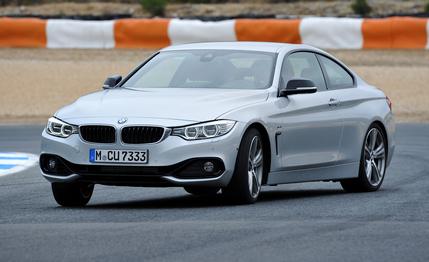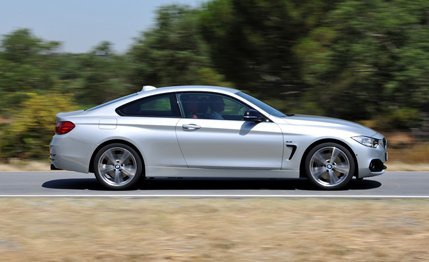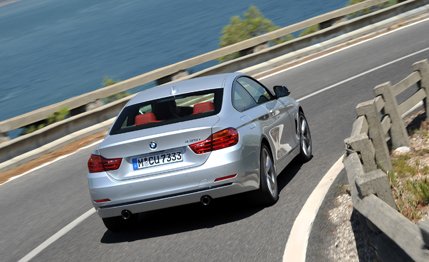 First Drive Review
First Drive Review
The sixth generation of the venerable BMW 3-series debuted for the 2012 model year to widespread acclaim from mommy bloggers, hypermilers, and the tech press alike, each group enthralled with the Ultimate Driving Machine’s new features. Or at least we imagine they were. Truthfully, we have no idea what these people thought and we don’t much care. But who else is going to get excited by a car that parks itself, helps you drive like Wayne Gerdes, and allows posting to Facebook while carving corners?
Apparently, us. Looking past BMW’s fascination with features that have little to do with the company’s core virtues, we found them mostly intact: good controls, dynamic handling, and excellent all-around performance. Despite a drop-off in the level of engagement in this newest 3-series, we have continued to enjoy the F30 sedan well enough to keep the model on our 10Best list, all the while hoping improvements might show up in subsequent variants. With the F32 4-series, that’s exactly what we’re getting.
Forensic Anthropology of a 3-series
The car formerly known as the 3-series coupe has been broken off into its own model line, a consequence of taxonomy being as important to Germans as punctuality and pretzels, but also because the 4-series is meant to diverge from its sedan sibling more than in the past. Outward suggestions are subtle: Bulging rear fender arches make the taper of the roof seem more extreme than it really is, and functional vents aft of the front wheels add brightwork as they channel air more efficiently through the wheel wells. The 4’s LED headlights are exclusive–or at least until the mid-cycle refresh of its sibling sedan.

BMW will offer the 4-series in four familiar configurations: 428i, 435i, 428i xDrive, and 435i xDrive. (No, we are not getting the detuned 420i or diesel 420d models sold in other markets.) Pricing starts at $41,425 for the 428i and $46,925 for the 435i, with all-wheel-drive versions tacking on an extra $2000. As in the 3-series, Luxury, Sport, and M Sport trim lines will be offered. The standard transmission is an eight-speed automatic, with a six-speed manual available as a no-cost option on all models save the 428i xDrive.
If the F30 is BMW expanding its tent, the F32 is the corner where enthusiasts are expected to take shelter. Although the basic structure and mechanicals carry over, including the 240-hp turbocharged four in the 428i and the 300-horse turbo inline-six in the 435i, a reworked chassis makes the coupe noticeably sportier. The 4-series is lower and wider, and its suspension is stiffer, too. A roofline two inches shorter than the sedan’s and a ride height 0.4 inch lower give the coupe a center of gravity BMW says measures 19.6 inches high, which would put it 0.1 inch above what we’ve measured for the Porsche Cayman. The front track of the sedan has been extended by 0.3 inch to 60.8 inches in the 4-series, and the rear track is an additional two inches wider. BMW added two braces between the front subframe and the body, similar to what would be used on a convertible, as well as firmer bushings and springs.
Less Formal, More Formidable
Nobody would tell us how much starch this adds to the recipe, but the 435i we drove felt more stable than an F30 sedan, with less fore-and-aft pitching and no deterioration in ride quality. Our car was a European Sport model with the Dynamic Handling package ($1000), which includes adaptive dampers and variable-ratio steering, and 19-inch wheels wrapped in performance rubber ($900). It also had the latest iDrive 4.2, which sees the infamous control knob return to its larger size, providing a suitable surface on the top of the knob for touch writing, a feature cribbed from Audi.
 Alphanumeric Assignments
Long ago, the first step toward joining the Bimmer enthusiast clique was understanding how to decipher the brand's coded trunk badges, which denoted technical details about each car. Not that this was difficult, as a 320i in 1977 was, simply, a 3-series with a fuel-injected 2.0-liter engine.
But the 325e of 1984 became the first of an increasing number of 3-series models to distort the displacement-specific badges. The 325e's low-revving 2.7-liter inline-six, called eta after the Greek letter engineers use for efficiency, put a frugal engine in the 3-series body while paving the way for further alphanumeric sleight of hand, such as the 2.5-liter in the 1998 323i and the 3.0-liter engines in the 2007 naturally aspirated 328i and turbocharged 335i.
Other suffixes appeared intermittently. An "is" designation meant your BMW was a particularly sporty car, while "x" meant four-wheel drive. And the appearance of a diesel model was celebrated with a "d." Two-door models occasionally got "c" badges appended. Let's not forget the mostly forgettable hatchback of 19951999, which revived the old "ti" moniker, for turismo internazionale.
By the time the current 3-series hit the market, BMW had given up any pretense of the badge reflecting engine displacement. Models henceforth begin with 3 (sedans, wagons, and Gran Turismos) or 4 (coupes, convertibles, and Gran Coupes), and the two numbers that follow reflect what BMW calls the "virtual displacement" of the turbo engines, giving tailgaters a roundabout way of accurately placing BMWs in the numerical hierarchy, old or new. The mess of following letters can be parsed as follows: "i" for the gas models, or "d," as always, for diesels. Four-wheel drive sees a separate and silly "xDrive" badge. So the new system may be more rational than what came before it, but it does lack a certain esoteric charm.
Alphanumeric Assignments
Long ago, the first step toward joining the Bimmer enthusiast clique was understanding how to decipher the brand's coded trunk badges, which denoted technical details about each car. Not that this was difficult, as a 320i in 1977 was, simply, a 3-series with a fuel-injected 2.0-liter engine.
But the 325e of 1984 became the first of an increasing number of 3-series models to distort the displacement-specific badges. The 325e's low-revving 2.7-liter inline-six, called eta after the Greek letter engineers use for efficiency, put a frugal engine in the 3-series body while paving the way for further alphanumeric sleight of hand, such as the 2.5-liter in the 1998 323i and the 3.0-liter engines in the 2007 naturally aspirated 328i and turbocharged 335i.
Other suffixes appeared intermittently. An "is" designation meant your BMW was a particularly sporty car, while "x" meant four-wheel drive. And the appearance of a diesel model was celebrated with a "d." Two-door models occasionally got "c" badges appended. Let's not forget the mostly forgettable hatchback of 19951999, which revived the old "ti" moniker, for turismo internazionale.
By the time the current 3-series hit the market, BMW had given up any pretense of the badge reflecting engine displacement. Models henceforth begin with 3 (sedans, wagons, and Gran Turismos) or 4 (coupes, convertibles, and Gran Coupes), and the two numbers that follow reflect what BMW calls the "virtual displacement" of the turbo engines, giving tailgaters a roundabout way of accurately placing BMWs in the numerical hierarchy, old or new. The mess of following letters can be parsed as follows: "i" for the gas models, or "d," as always, for diesels. Four-wheel drive sees a separate and silly "xDrive" badge. So the new system may be more rational than what came before it, but it does lack a certain esoteric charm.

The elephant in the room is steering feel–or the relative lack thereof in the 3-series. The 4-series is better, especially at turn-in, thanks to those efforts made at stiffening the front end. But there are still a few degrees of numbness off-center and an artificiality to the heft that’s unmistakably different from all the little tugs and jerks that used to come through the wheel in the old 3-series with hydraulic assist. Suffice it to say that we’re still not satisfied.
BMW’s engineers are, however, proclaiming that the reduction in steering feel is both inescapable and intentional and that, in line with customer demand, they’ve removed only the “bad” feedback. They seem to believe it when they say they’ve developed the best electric power steering on the market. When we mentioned the Cayman, which offers superb electric steering, we were told that wasn’t fair because the F32 is not a sports car. Fine then, we’ll wait for the M4.